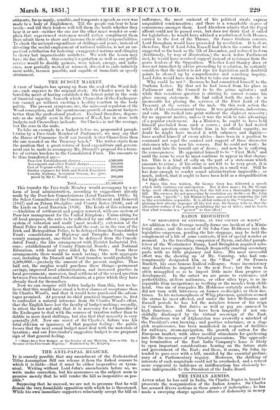THE BUDGET MARKET.
A CROP of budgets has sprung up from the seed of the Wood fail- ure, each superior to the original stock. Sir Charles must be al- lowed the merit of having established the lowest point in the scale of financial capacity, beneath which Chancellor-of-the-Exchequer- ism cannot go without exciting a healthy reaction in the body politic. The present symptoms are, the universal repulsion of the Wood conception, and the spontaneous growth of amateur budgets better than the professional prodt:ct. England therefore, degene- rate as she might seem in the person of Wood, has in store both budgets and Chancellors inchoate. Sir Charles is not the average, but the zero in the scale.
To take an example in a budget before us, propounded pamph- letwise by a Free-trade Member of Parliament, we may say that the House of Commons itself can furnish better Chancellors than the one reseated on the Treasury bench.* The writer starts from the position that a great reform of local expenditure and govern- ment can be made to accompany Mr. Disraeli's proposal for a trans- fer of certain burdens to the Consolidated Fund. The amounts to be thus transferred are-
Poor-law Establishment charges £500,000 Assessments and other Parish charges 200,000 Cost of Vagrant-relief, &c. 200,000 Similar expenses for Irish and Scotch Poor-laws 400,000 Lunatic Asylums, Decennial Census, &c. (pro- posed by Sir C. Wood) 200,000 Total £1,500,000
This transfer the Free-trade Member would accompany by a re- form of local administration, according to suggestions already made by the Poor-law Commissioners (Local Taxation, 1843); by the Select Committees of the Commons on Settlement and Removal (1847) and on Prison Discipline and County Rates (1850), and of the Lords on Local Taxation (1850). The heads of this reform are —Abolition of settlement and pauper removal, with one system of Poor-law management for the United Kingdom ; Union-rating for all local purposes, the rate to be collected by one officer; improved system of valuation and audit [most needed]; extension of the Rural Police to all counties, one-half the cost, as in the case of the Irish and Metropolitan Police, to be defrayed from the Consolidated Fund ; consolidation of Highway and Turnpike Roads, under county management, one-third to be defrayed from the Consoli- dated Fund ; the like arrangement with District Industrial Pri- sons; establishment of County. Financial Boards ; and National Education, with local rates aided by the State. From these arrangements there would be much saving ; the nett aggregate cost, including the Disraeli and Wood transfer, would probably be 2,500,0001.—precisely the amount of the present surplus. Thus laid out, the surplus would purchase these things—permanent savings, improved local administration, and increased practice in local government; moreover, final settlement of the vexed question between Free-traders and Protectionists, at a price which they have already fixed for themselves. Now we can imagine still better budgets than this, but we be- lieve that this would have stood a better chance of acceptance than Sir Charles Wood's, and that it would have purchased- the advan- tages promised. At present its chief practical importance is, first to contradict a natural inference from Sir Charles Wood's effort, that the English have lost the faculty of budget-making; secondly, to attest the fact not only that it is necessary for a Chancellor of the Exchequer to deal with the sources of taxation rather than to dabble in mere fiscal shiftings, but also that that necessity is very generally felt. Now one secret of Sir Charles's failure was his total oblivion or ignorance of that popular feeling; the public knows that the next sound budget must deal with the materials of taxation ; and our Free-trader's suggestive budget is one pregnant sign of that general feeling.
•
"Hints for a New Budget, at the Service of any Ministry, New or Old. By a Member of the Free-trade Majority." Published by Mr. Ridgway.


























 Previous page
Previous page